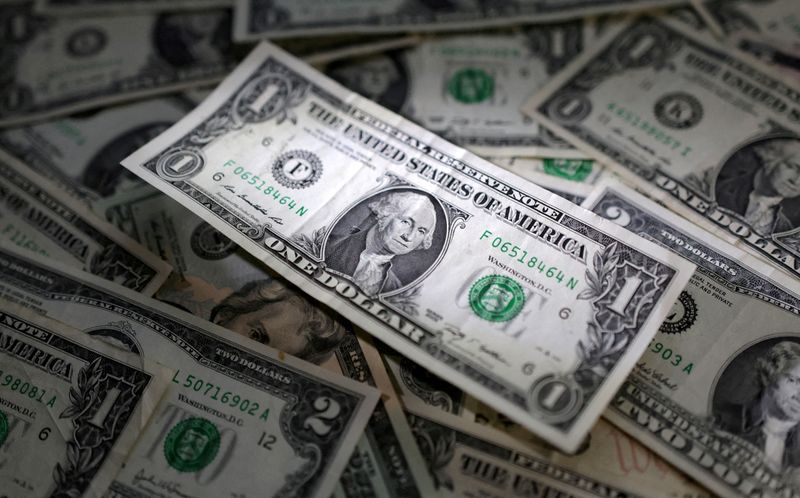By David Randall
NEW YORK (Reuters) - A potential U.S. government shutdown at the end of September could add to worries about the economy going into year-end and beyond, investors said.
Current funding for most government programs expires on Sept. 30. If lawmakers are unable to pass a new budget by then, large swathes of government functions would shut down, an event strategists at Goldman Sachs estimate would reduce U.S. economic growth by 0.2% for each week it lasted.
A partial closure of the government, which will not interfere with essential functions like the military or Social Security payments, is not seen to be as toxic to the economy as a failure to increase the government’s debt limit, an outcome lawmakers narrowly avoided earlier this year.
Past shutdowns' impact on U.S. stocks, meanwhile, has been slight: the S&P 500 has fallen by an average of 0.4% in the week before a shutdown, and gained a total of 0.1% over the length of all shutdowns since 1976, according to CFRA Research data.
Investors might be more sensitive to a shutdown this time around, however. Failure to pass a budget would highlight the gridlock and political instability that ratings agency Fitch cited as a reason for its downgrade of the U.S. credit rating in August, a move that roiled markets last month.
At the same time, a shutdown could lead to spending cuts that may dampen the economy at a time when other factors, including the Federal Reserve’s monetary policy tightening and the resumption of payments on student loans, loom as a threat to growth, analysts said.
Resilient growth in the face of higher interest rates has helped power the S&P 500 to a nearly 16% gain this year, though the index is off some 4% from its July highs following a surge in Treasury yields that has spooked some investors.
"You're going to get some reduction in government spending because that's the only way that these bills will pass,” said Jamie Cox, managing partner for Harris Financial Group, who is growing more bullish on defensive sectors such as healthcare. “That will create a meaningful slowing of the economy."
Hard-line Republicans in the House Freedom Caucus have insisted they will not support the spending bills necessary to fund the government for its next fiscal year without paring discretionary spending to $1.47 trillion, $120 billion below the level agreed to by House Republican Speaker Kevin McCarthy and President Joe Biden.
Goldman Sachs estimates that such a reduction would amount to a cut of 0.6% from the current U.S. gross domestic product.
With only weeks to go before the deadline, the Republican-led House of Representatives has approved only one of those 12 bills. Spending and tax measures normally originate in the House before moving to the Senate.
'LESS FRIENDLY POLICY'
If it occurs, the shutdown would be the fourth over the last decade and would furlough roughly three of out five federal civilian workers. The government would continue making payments on Treasury bonds.
Past shutdowns have usually been resolved in days, though a 2018 closure ran for 35 days and shaved 0.1% and 0.2% from real gross domestic product in the fourth quarter of 2018 and the first quarter of 2019, respectively, according to the Congressional Budget Office.
Paul Christopher, head of global investment strategy for Wells Fargo Investment Institute, believes any shutdown would likely be protracted as Republicans and Democrats begin positioning themselves for the presidential and congressional elections next year.
A deal that does not cut into the U.S. budget deficit may push yields on government debt higher, potentially extending a move that has wobbled stocks in recent weeks, said Christopher.
He is moving into areas of the market such as materials and industrials, believing high-flying sectors like tech are “overdue” for a correction.
The White House last month said it was working with Congress to hammer out a short-term funding measure to avoid a shutdown while longer-term spending talks continue.
Analysts at Ned Davis Research said a shutdown could add to factors threatening to roil the economy into next year.
“The potential for higher-for-longer monetary policy, the restart of student loan payments, a government shutdown, and lower (cost of living) adjustments in 2024 could combine for less friendly policy for financial markets,” they wrote.
The following table shows how the S&P 500 moved around each of the 20 government shutdowns since 1976, according to data compiled by CFRA Research.
Close Reopen Week Before Day of(%
(% change) change) Total
Change(%
change)
9/30/1976 10/11/1976 (1.4) (0.1) (3.5)
9/30/1977 10/13/1977 0.9 0.7 (2.5)
10/31/1977 11/9/1977 1.1 (0.3) 0.4
11/30/1977 12/9/1977 (2.0) 0.3 (1.0)
9/30/1978 10/18/1978 0.7 0.4 (2.0)
9/30/1979 10/12/1979 (0.2) (1.5) (5.2)
11/20/1981 11/23/1981 (0.8) 0.8 0.7
9/30/1982 10/2/1982 (1.8) 0.3 (0.1)
12/17/1982 12/21/1982 (3.1) 1.6 2.4
11/10/1983 11/14/1983 0.3 0.3 1.6
9/30/1984 10/3/1984 0.3 (0.9) (2.2)
10/3/1984 10/5/1984 (1.6) (0.7) (0.6)
10/16/1986 10/18/1986 1.3 0.3 (1.2)
12/18/1987 12/20/1987 3.3 2.5 2.7
10/5/1990 10/9/1990 2.2 (0.4) (2.4)
11/13/1995 11/19/1995 0.7 (0.1) 0.7
12/15/1995 1/6/1996 (0.1) (0.1) 0.2
10/1/2013 10/16/2013 (0.9) 0.8 2.4
1/19/2018 1/22/2018 0.4 0.4 1.2

12/22/2018 1/26/2019 (7.1) (2.7) 9.4
Averages 20 (0.4) 0.1 0.1